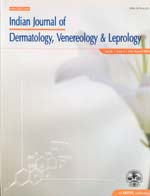
|
Indian Journal of Dermatology, Venereology and Leprology
Medknow Publications on behalf of The Indian Association of Dermatologists, Venereologists and Leprologists (IADVL)
ISSN: 0378-6323
EISSN: 0378-6323
Vol. 77, No. 4, 2011, pp. 477-482
|
 Bioline Code: dv11130
Bioline Code: dv11130
Full paper language: English
Document type: Research Article
Document available free of charge
|
|
|
Indian Journal of Dermatology, Venereology and Leprology, Vol. 77, No. 4, 2011, pp. 477-482
| en |
Chronic urticaria in patients with autoimmune thyroiditis: Significance of severity of thyroid gland inflammation
Gulec, Mustafa; Kartal, Ozgur; Caliskaner, A. Zafer; Yazici, Mahmut; Yaman, Halil; Ozturk, Sami & Sener, Osman
Abstract
Background: There is a clear association between autoimmune thyroiditis (AT) and chronic urticaria/angioedema (CUA). However, not all patients with AT demonstrate urticaria.
Aims: The aim of the study was to investigate in which patients with AT did CUA become a problem. A sensitive inflammation marker, neopterine (NP) was used to confirm whether the severity of inflammation in the thyroid gland was responsible for urticaria or not.
Methods: Neopterine levels were assessed in patients with AT with urticaria and without urticaria. Furthermore, levels were compared in relation to pre and post levothyroxine treatment. Twenty-seven patients with urticaria (Group 1) and 28 patients without urticaria (Group 2) were enrolled in the study. A course of levothyroxine treatment was given to all patients, and urine neopterine levels before and after the trial were obtained.
Results: All patients completed the trial. Mean age in Group 1 and Group 2 was similar (35.70 ± 10.86 years and 38.36 ± 10.38 years, respectively) (P=0.358). Pre-treatment urine neopterine levels were significantly higher in Group 1 (P=0.012). Post-treatment levels decreased in each group, as expected. However, the decrease in the neopterine level was insignificant in the patients of Group 2 (P=0.282). In Group 1, a significant decrease in post-treatment neopterine levels (P=0.015) was associated with the remission of urticaria.
Conclusion: In patients with CUA and AT, pre-treatment elevated levels of NP, and its decrease with levothyroxine treatment along with symptomatic relief in urticaria, may be evidence of the relationship between the degree of inflammation in thyroid and presence of urticaria.
Keywords
Autoimmune thyroiditis, Hashimoto′s thyroiditis, neopterine, urticaria
|
| |
© Copyright 2011 Indian Journal of Dermatology, Venereology, and Leprology.
Alternative site location: http://www.ijdvl.com
|
|
